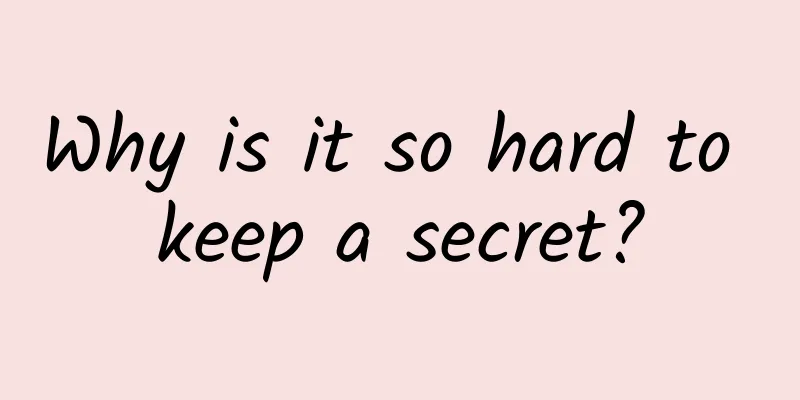Why is it so hard to keep a secret?

|
"I only told you this, don't tell anyone else!" I believe everyone has heard or said this sentence more than once in life. However, it seems that no matter whether you or someone else initiates this topic, there will always be a third party who knows this secret that should have been kept in the heart. Are we all "big mouths" in life? What factors are subtly influencing us to be qualified "secret keepers"? How can we keep our mouths shut? I believe that after reading this article, you will definitely be inspired. Why is keeping a secret sometimes harder than climbing to the sky? There is a strange thing that often happens in life. When a piece of information is defined as a secret and you are required to promise not to tell it to others, we suddenly have a compulsive and anxious impulse, and can't wait to share it with another person. Many people equate this idea or the corresponding disclosure behavior with a person's moral character, thus producing a corresponding stereotyped influence. Of course, it is undeniable that there are some corresponding correlations between the two. For example, people with low self-esteem or extreme desire for social needs are often more likely to spread the gossip and secrets they know to others in exchange for corresponding respect or a sense of belonging. But in most cases, the reason why it is difficult for us to keep secrets is actually because of our own need to relieve stress. On average, each person has to keep about 13 secrets at any time in life, and at least 5 of them are secrets that we have never told anyone else. To keep so many secrets at the same time, we not only have to make great efforts at all times, but also have to bear excessive pressure. Although we are not clearly aware of the existence of this stress, they will be presented in various physiological and psychological reactions, gradually eroding and damaging our physical and mental health over time. Dr. Michael Slepian, associate professor of ethics at Columbia Business School, published a research report in the Journal of Personality and Social Psychology, stating that after conducting hundreds of surveys and tens of thousands of people on the psychological factors behind secrets, it was found that when people keep secrets, they will suffer physical and mental harm. The more secrets a person keeps, the worse their health level, the less fun they can get from life, and the more fragile their interpersonal relationships will be. Some studies have also shown that keeping secrets can significantly increase stress hormones, affect blood pressure, inhibit sleep, lead to mental health and substance use disorders, and even increase chronic pain. In response to the above findings, Dr. Michael Slepian and Dr. Katie Greenaway of the Melbourne School of Psychological Sciences conducted three separate studies. More than 600 participants were involved, who kept 10,055 secrets between them, an average of 16.8 per person. These included abortion, job dissatisfaction, trauma, theft, sexual orientation, financial status, and were divided into at least 38 categories based on the importance of the secret, the nature of the secret, the degree of damage to the reputation of self and others, the probability of being discovered, etc. In the first study, participants were asked how close they were to the person they disclosed the secret to and how many times they had to hide it. The second study looked at the participants' social network and their assessment of the guilt and burden they felt when keeping secrets from their confidants. The third study focused on the phenomenon of mind wandering, for example, the frequency with which participants found themselves thinking about the secret content repeatedly or suppressing the urge to disclose the secret, which caused their minds to wander and absent-mindedness. The study found that participants would involuntarily think about the content of the secret during the process of keeping it secret. The more private the content was, the greater the psychological burden they had to bear. But when these secrets are leaked in various forms, whether intentionally or unintentionally, the frequency of participants' distraction, guilt and self-blame caused by depression will significantly decrease. Participants generally said that they would have an indescribable comfort experience after leaking, and their physiological indicators would gradually return to their original healthy state. The researchers mentioned in the paper that "when individuals feel the burden of confidentiality, they will subconsciously look for trustworthy people to pass on and share the pressure through leaking, and at the same time use it to promote relationships with others and increase intimacy, thereby neutralizing the inner apology and guilt when leaking. Therefore, the process of leaking is often a selective means for us to relieve our inner pressure. These complex confidentiality classification systems, plus the mental energy consumed to maintain their operation, the health effects brought about, and the physical and mental comfort we can get after leaking, have become one of the reasons why keeping secrets is more difficult than "climbing to the sky". How can I keep my mouth shut? Keeping too many secrets at the same time is very detrimental to a person's health, so we often let things slip unconsciously or actively release stress by leaking secrets. However, this can easily lead to us becoming the "target of public criticism" in social interactions and being labeled as a "big mouth". So what should we do about this dilemma? 1. Write it down and destroy it. Write down the secrets about others or yourself that you have hidden in your heart, and then destroy them completely. When you clearly see the paper full of secrets being destroyed, your subconscious mind will also receive corresponding suggestions, reducing psychological anxiety, guilt and guilt, so as to return to a normal and stable emotional balance level faster. 2. Open your heart to your pet. If you have pets at home, they are the best people to whom you can confide. You can safely tell them the secrets that have accumulated deep in your heart. Direct expression through language can simulate real social conversation scenes to the greatest extent. The decompression effect achieved is often much more efficient than simply writing it down. However, you'd better give your "pet listeners" some rewards after the confidant. Otherwise, they may not be so patient next time. 3. Understand the importance and time limit of the secret. The above two methods are very effective if you know the content of the secret. However, the best way is to start from the source of information dissemination. If someone says they want to tell you a secret, you can first ask to get more information, for example, whether the confidentiality is permanent or temporary. Studies have shown that when people know that confidentiality is limited, the success rate and motivation of keeping secrets will be greatly increased. In addition, by asking, you can find out whether it is a "small" secret or a "big" secret. This will let you understand the significance of keeping secrets and the consequences of leaking secrets, so as to judge whether you really want to continue listening. 4. Prevent the other person from telling you secrets. There is no better way to keep your mouth shut than not knowing anything at all. If you know that you are really not good at keeping secrets, you can take the initiative to confess your problems to the other party. This will not only make others appreciate and respect your honesty, but also resolve the stress from the root and a series of social relationship problems that may be caused by leaking secrets. References: 【1】Slepian, ML, Masicampo, EJ, Toosi, NR, & Ambady, N. (2012). The physical burdens of secrecy. Journal of Experimental Psychology: General, 141(4), 619–624. https://doi.org/10.1037/a0027598 【2】Slepian, ML, & Greenaway, KH (2018). The benefits and burdens of keeping others' secrets. Journal of Experimental Social Psychology, 78, 220-232. This article is a work supported by Science Popularization China Starry Sky Project Author: Tang Yicheng Reviewer: Fan Chunlei, Associate Researcher, Institute of Psychology, Chinese Academy of Sciences Produced by: China Association for Science and Technology Department of Science Popularization Producer: China Science and Technology Press Co., Ltd., Beijing Zhongke Xinghe Culture Media Co., Ltd. |
<<: Is your salt level high as a punk health practitioner?
>>: Be careful if you have a fear of giants! There is a 3-meter-long catfish here! | Natural Trumpet
Recommend
If Russell were alive today, he would probably tear up WeChat
[[155156]] "The ability to spend leisure tim...
Faraday Future Financial Report: Faraday Future's operating loss in Q1 2022 was approximately US$149 million, and FF91 pre-orders were 401 vehicles
According to recent news, Faraday Future (FF) off...
Science and Technology News Morning Express丨my country's research team extracted nearly perfect quantum entanglement for the first time
>> Chinese scientists have made important p...
The source of programmer pain: a bug
//I am a front-end developer, but I think this st...
Can you believe it? It was once freezing cold near the equator
Angola, Africa, near the equator, has a tropical ...
Tips: Don’t use emojis indiscriminately, especially at work...
If your two boyfriends/girlfriends each replied w...
Insights: True self-discipline is to be responsible for your own life
Famous Artists Gallery | Chen Banding, also known...
Which one is more important, conversion or traffic?
Why conversion is more important than traffic Fro...
[Fighting the "Three Summers" to Ensure a Good Harvest] In addition to the "rotten rain", wheat harvests also need to guard against these meteorological disasters
At present, wheat has gradually entered the conce...
How much energy was there at the time of the Big Bang? An incredible truth is deduced
A friend invited me to answer this question: The ...
Zhou Hongyi: 360 is too conservative in making smart hardware
[[141850]] Zhou Hongyi said that the Internet bus...
Goodbye WeChat! My WeChat chat history is not worth 180 yuan
Saving and migrating WeChat chat history has alwa...
How to plan an efficient APP marketing operation plan
In recent years, mobile Internet has developed ra...
How do iOS 12 and Android 9 fight phone addiction?
In iOS 12 and Android 9 Pie, both Apple and Googl...









